Festival 2024 > Exhibition
Exhibition
Welcome to the Festival exhibition of citizen engagement and deliberative processes. Browse through projects that involve citizens in addressing environmental and related issues - and make sure you come back, as we will be updating this page with new cases.
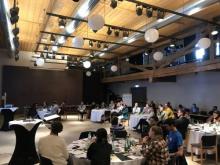
Project description
Between 26-28 January 2024, a citizen jury was convened at the Schloss Thurnau in Upper Franconia, Germany to deliberate about new genomic techniques (NGTs) used in agriculture and food/feed production, ahead of the vote of the European Parliament and the Council of the European Union on the European Commission’s proposal for a regulation on plants obtained by certain NGTs and their food and feed. 24 jury members were selected based on stratification criteria, with the primary consideration being discursive representation on the topic of NGTs. The jury’s selection aimed at striking gender balance and further demographic criteria. Nearly half of the jury members fell within the age group of 18-24, reflecting the importance of youth perspectives in decision-making, especially on the issue of NGTs. The central focus of the jury's deliberation was a question aimed at leading an informed and structured discussion surrounding the needs, purposes, conditions, and impacts of NGTs.
Implemented by
University of Bayreuth, Chair of Food Law, Faculty of Life Sciences
Where and When
Schloss Thurnau, Thurnau, Germany, 2024
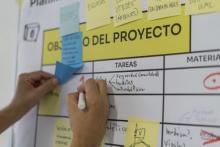
Project description
The Urban Health Citizen Lab is an open and inclusive meeting space aimed at promoting the development of common ideas through experimentation and collective learning. The main aim of the project is to create a collaborative space to encourage community participation in shaping the research on urban health and promoting more resilient, healthy, sustainable, and inclusive neighbourhoods. The laboratory is articulated in four phases: 1. a participatory diagnosis to define problems of interest to citizens; 2. a citizen science process for participatory research; 3. a social innovation phase to propose solutions, and 4. a communication phase to disseminate the results. The modular methodology used in CSU LAB allows participants to join any of the phases, either generally or specifically, considering their diverse availability and interests, ensuring a flexible and inclusive space for participation.
Implemented by
Barcelona Institute for Global Health
Where and When
Barcelona, Trinitat Vella neighbourhood (Spain), 2022
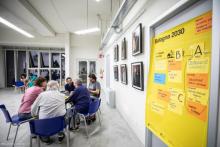
Project description
The Climate Citizens’ Assembly of Bologna involved 100 citizens selected via stratified random sampling and aimed to guide the Municipality of Bologna towards achieving climate neutrality by 2030. More precisely, the participants had to define recommendations and proposals addressing three questions related to the ecological transition focused on mitigation, adaptation and administrative tools. From May to November, the Citizens’ Assembly was composed of nine meetings across four phases. The first two phases were focused on listening to experts in different areas related to climate change and some of the local stakeholders, while the third phase involved discussions and deliberation between the participants. Lastly, during the decision phase, the participants approved a document consisting of six recommendations and 24 proposals. Currently, the Municipality of Bologna is examining the document and before the end of March has to comment on them, deciding which one to accept, modify or reject.
Implemented by
Fondazione Pietro Giacomo Rusconi, Villa Ghigi, per l’Innovazione Urbana
Where and When
Bologna (Italy), 2023
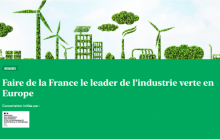
Project description
The French Ministry of Economy launched a 3 month initiative to boost the green industry's growth with two objectives: making France a leader in decarbonization technologies and supporting industry-wide decarbonisation. The Ministry collected ideas from 300 stakeholders. With Make.org's Dialogue platform, the public and stakeholders provided input, enriching eight proposals. The platform fosters collaboration between institutions and citizens, enabling early involvement, feedback, and informed participation. The results were integrated into law. In consequence, various low-carbon industrial projects have been announced, including topics that were also discussed on the Platform. It has contributed to reorienting the French government’s industrial policy in a more local, circular, low-carbon and energy-efficient direction. The collaborative effort of the platform with 8000 participants, 3000 comments, and 30000 reactions, emphasised the success of online tools in shaping green policies. Read more about the project here.
Implemented by
Where and When
France, 2023
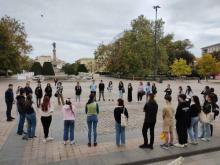
Project description
The Danube Design Lab for Collaborative City Planning was designed for students from 8th to 12th grade, and included six days of intensive work under the guidance of a team of trainers and architects of the Collective Foundation. The project focused on the parts of the city that are connected to the riverfront, which in Ruse is a huge area as the Danube river crosses the city. During the laboratory, 30 students from various vocational and language schools in Ruse developed five projects for urban change, supported by scale models and a comprehensive strategy for their implementation. The projects impress with their conceptual design, care for the the environment and the community, and aesthetic craftsmanship. At the final event in the city’s Theatre building, mixed teams of students presented their projects and sought broad support from all those interested in proposals for the transformation of the urban space through the eyes of the young people of Ruse.
Implemented by
Where and When
Ruse (Bulgaria), 2023
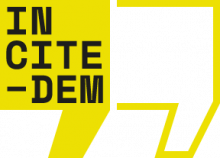
Project description
In the framework of the EU-funded research project INCITE-DEM - Citizens Reinventing Democracy - (www.incite-dem.eu), 6 Democracy-Labs are organized in different European countries (Finlandia, Germany, Italy, Portugal and Spain) to explore new ways of involving Citizens into the Policy-making cycle, at local, national and European level.
DLabs are citizen-centered and multi-stakeholders co-creation spaces for democratic innovation, based on a Policy Lab approach. DLabs provide spaces for transformation, innovation and reflection, involving a constellation of actors (e.g., citizens, democratic innovation initiatives, investors and technology developers, policy actors and bureaucrats, researchers and experts) in co-producing and reflecting on the planning, implementation and/or assessment of new ideas, solutions, products or services for inclusive democratic innovation.
Implemented by
Where and When
Barcelona (Spain), 2024-2025
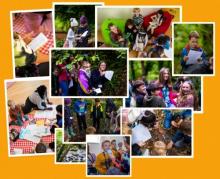
Project description
Ireland's Children and Young People’s Assembly on Biodiversity Loss met over two weekends in October 2022 and brought together 35 randomly selected Members aged 7-17 from across Ireland to explore, discuss and create calls to action on how to protect and restore biodiversity in Ireland. It took place in parallel to a national Citizens' Assembly on Biodiversity Loss for the adult population in Ireland.
The Assembly's key outputs included a vision statement, six key messages, and 58 calls to action. Minister Malcolm Noonan, the government minister with responsibility for nature and biodiversity, joined the Assembly on its final day to receive their calls to action.
In November 2023, representatives from the Assembly were invited to present their calls to action to a session of the Parliamentary Committee on Environment and Climate Action. Many of the calls to action have been reflected in a new National Biodiversity Action Plan, published by the Irish Government in February 2024.
Implemented by
Dublin City University and University College Cork
Where and When
Ireland, 2022

Project Description
ISEED, coordinated by UNIVE, explores forms and strategies to engage citizens in knowledge-based public deliberation by using lessons derived from the field of citizen science. Cases of citizen and community-based science are explored in view of envisaging what conditions promote people’s informed inclusion and participation in creating knowledge-based democratic deliberation.
Our insight is applied to cases of public debate driven by science-based issues, paying particular attention to the variety of 'publics' included and of counter-publics marginalized in these debates. As an interdisciplinary project, ISEED uses a range of empirical methods and academic approaches to understand what makes for inclusive, knowledge-based deliberation in Europe. We combine theoretical analysis, in philosophy and the social sciences, with empirical research, using qualitative approaches such as discourse analysis, interviews and focus groups, but also digital text analysis and tool development.
Implemented by
Ca' Foscari University of Venice
Where and When
Bulgaria, France, Ireland, Italy, Norway, Poland, United Kingdom, Uruguay, 2021-2024
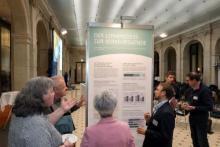
Project description
Climate targets on their own do not guarantee success. To achieve them, concrete measures and a joint learning process between science, politics, business and society are needed. Citizens have thus been engaged in the research on the energy transition from the very beginning of the Ariadne project through a variety of dialogue formats. Citizens are involved in research questions regarding the transport, electricity and heating transition and distributional effects of climate measures.
There is a continuous alternation between citizen events, such as online discussions and citizen conferences, and Ariadne research phases. The focus is on a common understanding of the challenges and viable solutions. Ariadne explores energy transition strategies and their systemic effects, as well as sectoral interactions, and investigates how policy instruments can achieve climate goals in an efficient and socially balanced way.
Implemented by
Where and When
Germany, 2020-2026
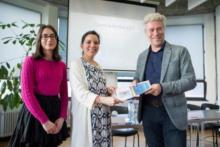
Project description
In 2022, together with 14 partner organizations across Europe, ECAS implemented the first-ever transnational crowdsourcing on the topic of ‘air quality’. Citizens in 10 different cities were called upon to identify their issues with air pollution and propose policy solutions to their decision-makers at local, national and European level. Thousands of people joined the one-year crowdsourcing platform to give their contributions which ultimately led to 10 main recommendations co-created with the EEB and brought to the EU policy-makers. We also developed an Assessment Framework for E-Participation which was used to evaluate the whole process and led to 15 recommendations for crowdsourcing at the EU level.
Implemented by
European Citizen Action Service
Where and When
Ten European cities: Athens (Greece), Riga (Latvia), Tallinn (Estonia), Lisbon (Portugal), Burgas (Bulgaria) and Budapest (Hungary), Montenegro (Podgorica), Germany (Berlin), Belgium (Brussels), Netherland (Amsterdam), 2021-2023.
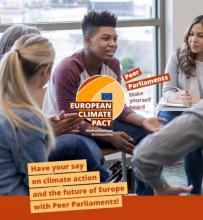
Project description
Is it possible to design cities that allow citizens to meet their basic needs (shopping, education, parks, recreation areas, etc.) within 15 minutes by bike or on foot?
This was the main leading question that the European Climate Pact Ambassadors Ifigeneia Souflia and Alexandra Politaki asked the 40 participants of the Peer Parliament that took place at the Institute for Research and Social Change in Athens, Greece on 29th of March 2024.
Following the standard approach of a Peer Parliament, the session had three distinct moments: learning, discussion and voting. The voting options placed to the consideration of participants covered policy and leadership aspects, as well as the role of the social and cultural norms. The results of the group’s voting were shared with the European Climate Pact; afterwards they’re brought up to the attention of policymakers at EU level, revealing relevant policy insights gathered through deliberative discussions.
Implemented by
European Climate Pact, Belgium
Where and when
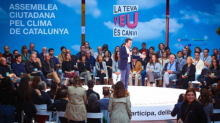
Project description
The Citizen Climate Assembly of Catalonia is an innovative project of deliberative democracy and citizen participation that involved the participation of 100 citizens from all over Catalonia, chosen randomly and according to demographic stratification criteria so that different profiles of Catalan society are represented.
The aim of the Assembly was to respond to specific climate change challenges in the fields of energy and agri-food, in order to deliberate and draw up well-informed recommendations for decision-making on the Generalitat's policies related to these areas. These challenges have been approached from the perspective of dilemmas linked to the policies and competences of the Government of Catalonia. This means that we have gone beyond purely technical solutions by seeking the positioning of the participants, after considering the benefits and costs, from the perspectives and interests of the different experts
Implemented by
When and where
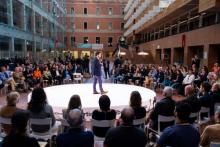
Project description
Climate change is one of the most critical issues to tackle today as it is foreseen to have detrimental social, environmental and economic impacts in the near future. Climate assemblies (CA) and Living Labs (LL) are considered as sustainable and reasonable tools to stimulate deliberative democracy in climate policymaking.
The ambition of the current project is to support a transformation to climate resilience by offering an innovative problem-oriented climate adoption Toolbox that will anticipate possible tensions, points of controversy and dilemmas vis-à-vis the adaptation to resilience - therefore enabling empowerment and engagement strategies that produce a society "resilient by design". CLIMAS will include the empirical component for testing this Toolbox and formulating scientific-based guidelines for policymakers on how to shift CA from technical deliberations that belong to experts to multi-stakeholder deliberations based on solving the dilemmas bottom-up value-based way.
Implemented by
Vilnius Gediminas Technical University
Where and When
Lithuania and Spain, 2023-2025
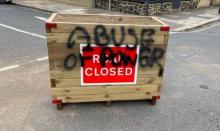
Project description
We have been working with a London borough for several years on its approach to involving stakeholders in its climate strategy. A major element is a programme of changes to the operation and appearance of its streets, notably employing “low-traffic neighborhoods” which prevent rat-running and, in the process, make walking, wheeling and cycling more attractive.
These have proved highly controversial so we have sought more effective ways of engaging people on all sides of the debate in constructive dialogue in pursuit of increased consensus and reduced acrimony.
The Win-Win Workout is a novel approach based on seeking common ground amongst people of opposing views through role play and structured discussion. We contrast it with more conventional methods, seeking a balanced portfolio of engagement approaches.
The project addresses the case for deliberation, co-design, seeking socio-demographically representative opinions and ensuring all interested parties feel they have a voice.
Implemented by
Active Travel Academy, University of Westminster
Where and When
Project description
Nets4Dem envisions a future where all Europeans have a voice in decision-making processes and public authorities embed meaningful citizen engagement into their cultures and structures.
Our mission is to strengthen democracy by building an innovative infrastructure for connection and collaboration across the EU and associated countries based on local, national and European-wide networks.
We are funded by the EU's Horizon programme to make the existing cutting-edge research on democratic innovation systematically accessible and builds capacity to move from ideas to execution.
Implemented by
Where and When
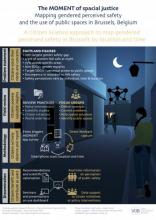
Project description
The link between public space design and gendered safety perceptions is clear, yet Brussels and Belgium lag in ensuring public safety, often overlooking minor offences as routine, thus rendering the issue of public insecurity invisible. This project aims to chart the gendered safety perceptions in Brussels' public spaces as they happen, serving both as a real-time safety "barometer" and a resource for stakeholders and policymakers.
It focuses on engaging citizens and organisations in its threefold objectives: defining key concepts and identifying issues and solutions through focus groups; employing time-fencing and geofencing to observe public space safety; and leveraging findings to enhance safety measures and back interventions. Through this citizen science approach, the project not only addresses immediate safety concerns but also contributes to the long-term goal of transforming public spaces into environments where everyone feels secure.
Implemented by
BRISPO, Sociology Department, Vrije Universiteit, Brussel
Where and When
Brussels Capital Region, 2023-2027
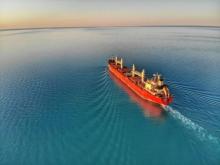
Project description
The Global Citizens Dialogue on the Ocean is a pioneering initiative employing the "Assembly of the three Thirds" methodology, where 40 participants assume roles as present-day humans (1/3), humans from the year 2234 (1/3), and the Ocean and its living systems, rotating these roles throughout the dialogue cycles. Discussions are structured into three stages, focusing on human-ocean interactions, futuristic resource extraction methods, and addressing critical challenges facing ocean sustainability. Participants, grouped by continent and profiles, explore questions concerning human relationships and activities affecting the ocean as in role-playing, by confronting a hypothetical scenario involving the scraping of the ocean floor for mineral resources, debating the ethical, environmental, & economic implications. A pilot is planned in Barcelona in April 2024, and we offer to showcase the methodology in a poster but also to live and discuss the methodology in a simulation/workshop format.
Implemented by
Where and When
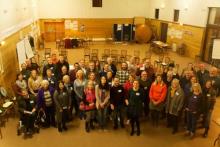
Project description
As part of our Shoreline Engagement project, Bude Climate Partnership organised a citizens jury to help our community come to a communal decision on how to respond to climate change, and particularly the threats to our shoreline, which is the most sensitive to sea level rise in the UK.
Working with Shared Future CIC, and drawing on the evidence of 21 expert commentators, and working with the Environment Agency and Cornwall Council as consultants, we held five days of facilitated deliberative engagement. It resulted in a report, a film, a series of digital stories, and a set of 29 recommendations and 11 principles.
Already the project has had positive outcomes: the award of £3 million funding from the UK government's Coastal Transition Accelerator Programme to help our community pilot responses to coastal change; collaborations with universities and other organisations; the development of a national network of coastal communities facing sea level rise and other climate impacts.
Implemented by
Where and When
Bude, Cornwall, United Kingdom, 2023 onward
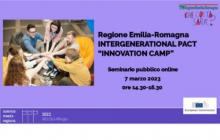
Project description
The process focused on the co-design of the GIDAC Strategy for the Emilia-Romagna Coast. The process started in April 2021, supported by Decidim regional platform "PartecipAzioni": 7 participatory workshops (general/local), 195 overall presences, Municipalities, Universities, Economic, Environmentalist, Youth associations. A Public Consultation started in April 2022 on the draft Document issued by the workshops phase: more than 12.500 visualizations on the platform, 46 contributions/ proposals collected, most of them accepted and integrated in the Strategy Document finalized in December 2022. In March-April 2023 the process continued with a further cycle of workshops “Intergenerational Pact for the E-R Coast”, financed by the JRC SMR program, involving 15seniors+15young representatives of the 4Helix co-designing and prototyping intergenerational tools related to Governance, Communication &Participation, Learning & Knowledge improvement, for the implementation of the GIDAC Strategy.
Implemented by
Regione Emilia-Romagna (Italy)
Where and When
Region of Emilia-Romagna (Italy), 2021-2023
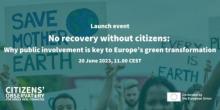
Project description
The Citizens, Equality, Rights & Values (CERV) 2021-27 fund actions that use a great variety of participatory tools/concepts. One strand of the programme aims to foster citizens' engagement and participation; in particular, engaging citizens and communities in discussions and action related to climate and environment. This priority boosts citizens’ and communities’ engagement in discussions and action related to our climate and environment. Switching to a ‘green’ way of living can only work if citizens are fully involved in designing the new policies.
The proposal is to select two, three projects that have used participatory approached indicated above and demonstrate how they have been used. The speakers will be representatives from civil society and associations that promote citizens’ dialogues that bring together citizens of all genders in all their diversity to discuss climate and green issues and propose solutions to decision makers. The link to the project below refers just to one project.
Implemented by
EACEA (European Executive Agency on Culture and Education)-DG JUST, Belgium
Where and When
EU member states and the Western Balkans, 2024
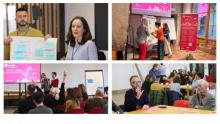
Project description
InformAria was run in Milan in 2023 to explore how engaging all concerned actors through sound participatory methodologies can co-create solutions to pressing global challenges, such as leading cities toward climate neutrality.
The participatory exercise explored co-creation as a collaborative approach to innovation. In it, actors from the quadruple helix (researchers, policymakers, industry, and civil society) worked together to design technological tools to support residents and city users in making informed decisions related to air quality in the city.
The process was coordinated and implemented by Fondazione Bassetti in collaboration with the Municipality of Milan, which is currently exploring the possible implementation of the two solutions developed together with citizens (i.e., a web/app and a system of displays distributed around the city).
InformAria was developed within the context of MOSAIC, an EU H2020 project.
Implemented by
Fondazione Giannino Bassetti, Italy
Where and When
Municipality of Milan (Italy), 2023
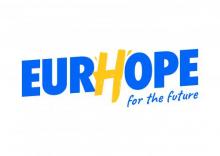
Project description
EurHope is a participatory campaign ahead of the 2024 European Elections, which united 1.5 million voices of young citizens from across the EU.
The proposals from young people which emerged from a consultation in its first phase, have shaped the drafting of an Agenda of Hope, which has been shared with European institutions and political actors. The Agenda of Hope aims to put young citizens’ priorities in the centre of the public debate ahead of the European elections.
Amongst those, are several ideas on how to build a more sustainable Europe for the future, such as promoting innovation in agriculture and sustainable farming and developing more efficient and accessible rail transport.
EurHope is supported by the European Parliament, the European Economic and Social Committee, the European Committee of the Regions and Vice-President of the European Commission, Dubravka Šuica. The campaign also gathers over 50 partners from civil society organisations and local institutions.
Implemented by
JEF Europe and Make.org, Belgium
Where and When
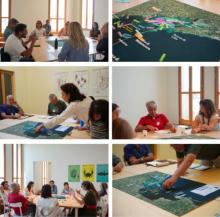
Project description
As part of the H2020 project WaterLANDS, WahV engages stakeholders, collaborating with the community to identify issues, gather local knowledge, and propose collective solutions to restore Venice lagoon’s saltmarshes.WahV seeks to understand people's relationship with the lagoon, crucial for environmental decision-making. A participatory mapping exercise was organised during the annual engagement workshop to explore individual and collective values connected to the lagoon’s resources. The exercise facilitates spatially explicit data acquisition while discussing.It has 3 thematic areas: Memory of the past, Reworking in the present, and Restoration for the future, aiming for a systemic progression from the Self to a more collective We. Instant reports at the end provided quick feedback and deliberation. Afterwards, WahV digitised the results into an open-access StoryMap, "Voices of the lagoon: socio-cultural values".The visual results become the intellectual property of the participants.
Implemented by
Where and When
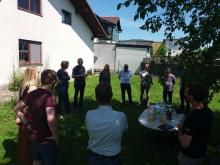
Project description
The aim is to decarbonise the building stock in Austria by 2040. To achieve this, building owners must switch their heating systems to renewable energy sources. At the same time, a significant increase in efficiency is required through comprehensive thermal-energy refurbishments. One area - the refurbishment of the single-family home stock - is a challenge in which municipalities play a key role. Together with municipalities, ÖGUT has developed a dialogue format that aims to increase the renovation rate in the residential building sector. On the other hand, the aim is to create communities of practice in the municipalities.
The public renovation dialogues start with a specific property and expand the individual consultation to include a broader dialogue with those responsible in the municipality and interested citizens. In this way, they help to initiate learning communities on refurbishment and decarbonisation in municipalities and spread the topic more widely.
Implemented by
ÖGUT - Austrian Society for Environment and Technology, Austria
Where and When
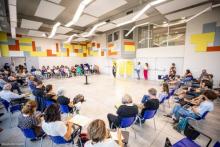
Project description
The Climate Citizens’ Assembly of Bologna involved 100 citizens selected via stratified random sampling and aimed to guide the Municipality of Bologna towards achieving climate neutrality by 2030. More precisely, the participants had to define recommendations and proposals addressing three questions related to the ecological transition focused on mitigation, adaptation and administrative tools.
From May to November, the Citizens’ Assembly was composed of 9 meetings across 4 phases. The first two phases were focused on listening to experts in different areas related to climate change and some of the local stakeholders, while the third phase involved discussions and deliberation between the participants. Lastly, during the decision phase, the participants approved a document consisting of 6 recommendations and 24 proposals. Currently, the Municipality of Bologna is examining the document and before the end of March has to comment on them, deciding which one to accept, modify or reject.
Implemented by
Fondazione Pietro Giacomo Rusconi, Villa Ghigi, per l’Innovazione Urbana, Italy
Where and When

Project description
Area Demos believes in the value of this workshop as a means to advocate democratic values and electoral participation, to promote peace and democracy through education. Why have we designed a project for primary students? Because the brain is a muscle. And if we ask athletes, they would explain to us how much they train constantly and since their early years. If we want a society ready to participate in all the meaningful deliberative and participatory methods that are there, training is key. And how to make elections interesting and nonpartisan for children to practice a memorable democracy day? We used our biodiversity (candidates are the Jungle, Ocean and Polar ecosystems) as well as water (its importance, the locations of its biggest reserves, etc.) to help conduce the electoral campaigning.
Children practice electoral systems and democratic values such as dialogue, consensus, respect, inclusion, coexistence and collaboration, while painting and learning about Nature. Mural art on a path to Democracy is to be experienced!
Implemented by
Where and when
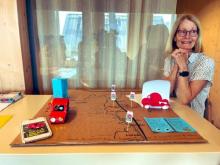
Project description
Gothenburg (Sweden) is one of the cities that have been selected within the EU “Climate-neutral and Smart
Cities” Mission. To experiment with citizen and stakeholder engagement in addressing some of its climate neutrality challenges, the city got involved in a fully quadruple-helix co-creation process, led by Stickydot together with city representatives from various departments. The process adopted a challenge-oriented approach, focusing on identifying collaborative solutions to making mobility more sustainable in a specific area of the city. A total of 40 individuals joined the process that lasted 6 months, which saw the participation of citizens, NGOs, researchers, private companies, and the city itself. Co-created solutions, showcased through storyboards and prototypes, strongly highlight the need for the city to focus on social components of logistical and technological solutions, for them to be adopted. This experience was carried out within the EU-funded MOSAIC project (H2020).
Implemented by
Where and when
